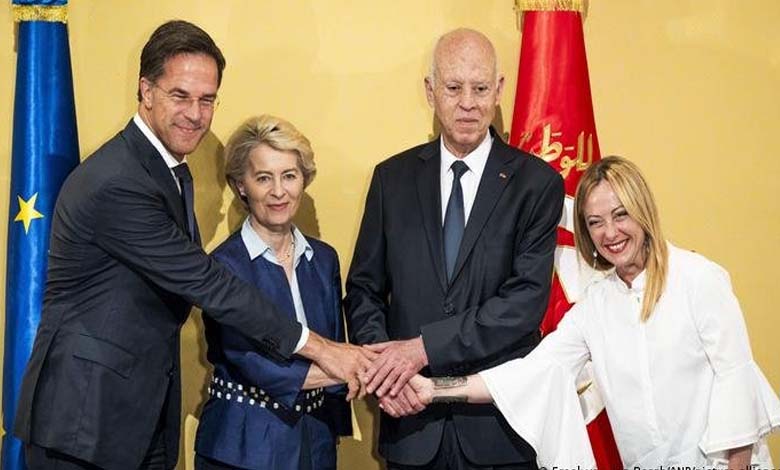EU-Tunisia memorandum of understanding witnesses breakthrough
A support program of €150 million has been released to assist the Tunisian government in promoting economic development through improving public financial management, supporting the business environment, and boosting investment

The European Union has allocated financial aid of €150 million to Tunisia, as announced by the Tunisian Ministry of Foreign Affairs and the European Commission, following disputes over the financial terms of the Memorandum of Understanding signed last July, which strained relations between the two parties.
According to the statement from the Tunisian Ministry of Foreign Affairs, “The European Union and Tunisia agreed on Wednesday on a support program worth €150 million to assist the Tunisian government in promoting economic development, particularly through improving public financial management, supporting the business environment, and boosting investment.” The Commission had previously signed a Memorandum of Understanding with Tunisia in mid-July for combating irregular migration in exchange for economic and financial incentives exceeding one billion euros.
The Tunisian Ministry of Foreign Affairs explained, “This European support falls within the framework of the Memorandum of Understanding on the comprehensive strategic partnership between Tunisia and the European Union, signed in Tunisia on July 16, 2023, covering five axes related to supporting overall economic stability, enhancing economic and trade relations, energy transition, people-to-people convergence, migration, and mobility.”
Tunisia, which allocates a significant portion of its resources to repay debts amounting to around 80% of its gross domestic product, urgently needs liquidity to finance the purchase of subsidized products such as milk, flour, and rice, facing chronic shortages in these essential goods.
The Commission stated in its release that the financial program aims to support the Tunisian government’s efforts to revive the economy by improving public financial management, the business climate, and investments.
However, Tunisia, which has become a focal point for tens of thousands of sub-Saharan African migrants seeking to cross the Mediterranean Sea, later expressed reservations about the slow disbursement of financial commitments. In October of last year, it returned European funding of €60 million, citing a violation of agreement regulations. The new funding will be directed to the Tunisian state treasury, facing financial difficulties.
The Tunisian Ministry of Foreign Affairs stated, “Tunisia and the European Union have declared their intention to work together to implement the five axes of the Memorandum of Understanding simultaneously and address common challenges within the framework of solidarity, mutual respect, and fair treatment.”
The European Union, contemplating amendments to the migration and asylum system, acknowledged a decline in the number of irregular migrants arriving through the Tunisian coast to nearby Italian islands over the past two months, after reaching record levels until August last year.
The Italian island of Lampedusa witnessed a surge in irregular migrants from the Tunisian and Libyan coasts during that period, prompting Italy to make extensive efforts to provide the necessary financial support to Tunisia, which is grappling with one of its worst economic crises, resulting in a loss of several essential commodities. This is amid difficulties in negotiations with the International Monetary Fund.
During the current year, the Tunisian government compensated for the financing gap through domestic borrowing to fund the budget without resorting to external borrowing, issuing local and national loans, as well as short and medium-term treasury bonds from Tunisian banks.
Tunisian Interior Minister Kamal Feki, in an interview with the German news agency, called for the activation of the Memorandum of Understanding between his country and the European Union and the delivery of the agreed-upon aid package. He stated that Tunisia would not play the role of the guardian of European borders and, amidst the economic crisis affecting the country, would not be able to accommodate the large numbers of migrants flowing into its territories from sub-Saharan African countries.











